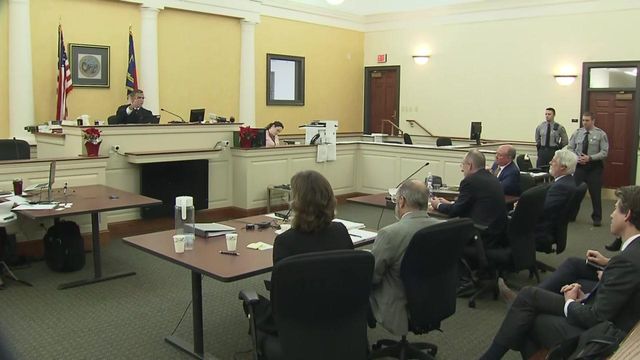Judge may reconsider approval of 'Silent Sam' deal
A Superior Court judge on Friday rejected a legal challenge to a $2.5 million deal giving the Sons of Confederate Veterans control of the controversial "Silent Sam" monument, but he still questions whether the group should have been party to the settlement to begin with.
Posted — Updated"It's my aim to do everything I can to get it right," Baddour said. "That result may not be something everyone agrees with."
Baddour said that, even if the deal is valid, he might need to have some oversight of the $2.5 million trust.
"He clearly has been following what’s been going on in the public commentary about what he did a few weeks ago, and he appears to be somewhat concerned about it," said UNC Law School professor Eric Muller, a critic of the deal.
Attorney Mark Dorosin argued Friday that the Board of Governors and the SCV "collaborated to develop a meritless lawsuit," which he said served as "a legal fig leaf" to obtain court approval of the deal.
The students and faculty needed to intervene in the lawsuit to ensure all issues surrounding the deal are properly examined, Dorosin said.
"The property and transaction in this case are the most significant public policy issue facing the university, the students, faculty and community in recent history," he said. "The university's history with respect to race is at the core of that issue, and [our clients] are the ones directly impacted by the manner in which the [Board of Governors and the SCV] have chosen to deal with this matter."
Press Millan, a lawyer representing the Board of Governors, argued that none of the students or faculty had actually been harmed by the deal. He also noted that no student or faculty member had ever gone to court to challenge Silent Sam's presence on the campus for decade – or even to press for the statue's return after it had been pulled down – because they knew they didn't have the legal right to make such a claim.
The Board of Governors tried for months to resolve the issue of Silent Sam's future, attorney Ripley Rand said. A special committee determined putting it back on its McCorkle Place pedestal would result in more protests and a risk to public safety, Rand said, and the board rejected plans for a special center on the Chapel Hill campus to house the statue and other historical exhibits.
When legislative efforts to change a 2015 state law governing Civil War monuments failed, he said, the board was left with one option: Find someone with an ownership claim to Silent Sam and work out a deal with them before legislative leaders or someone else filed a legal action seeking to return the monument to campus.
"The Board of Governors decided they were not going to risk a ruling ... that would make them put the monument back up," he said. "The Board of Governors did not want to win this case. The Board of Governors wanted finality to bring this issue to a close."
The board did what they thought was in the best interests of the UNC system when faced with a difficult situation, Rand said, adding that voiding the deal would force UNC to put Silent Sam back on campus as called for in state law.
"Sometimes in life, you are presented with a hard situation where you have options, and all of the options you have are hard," he said. "All of the options are painful, and there is no solution that won't cause someone pain."
Related Topics
• Credits
Copyright 2024 by Capitol Broadcasting Company. All rights reserved. This material may not be published, broadcast, rewritten or redistributed.






